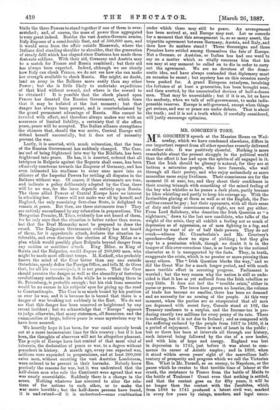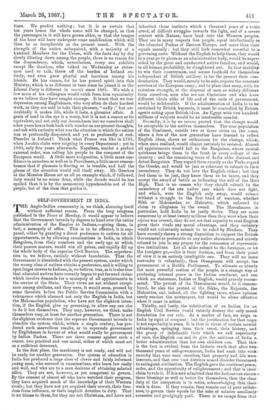MR. GOSOHEN'S TONE.
MR. GOSCHEN'S speech at the Mansion House on Wed- nesday, which we have condensed elsewhere, differs in one important respect from all other speeches recently delivered on either side. It was positively cheerful. Nothing is more remarkable about the present struggle in the political world than the effect it has had upon the spirits of all engaged in it. That the Irish should -be gloomy is natural, for they are at bottom a saturnine people, who love funerals, who wail through all their poetry, and who enjoy melancholy as more masculine races enjoy liveliness. Their consciences are for the moment ill at ease, too, and they shout their confidence in their coming triumph with something of the mixed feeling of the boy who whistles as he passes a dark place, partly because he likes whistling and partly to keep his courage up. With the Invinciblee glaring at them as well as at the English, the Par-. nellites cannot be gay ; but their opponents, with all their sense of duty and their consciousness of right, are not gay either. From Lord Salisbury, who describes the Irish Question as " nightmare," down to the last new candidate, who talks of the weight of the crisis, they all exhibit a feeling not so much of depression as of oppression, as of men fighting in a fog, and deprived by want of air of half their powers. They do not croak—witness Mr. Chamberlain's and Mr. Courtney's speeches—they show no signs of yielding ; but they give way to a pessimism which, though no doubt it is in the temper of this over-conscious time, is as foreign to the national character as it is unsupported by the facts. They, in truth, exaggerate the crisis, which is no greater or more pressing than many others. The " Irish Question blocks the way," and so did the Great War for a much longer period, and with much more terrible effect in arresting progress. Parliament is worried ; but the very reason why the nation is still so unde- cided is that it has as vet suffered from the Irish rebellion so very little. It does not feel the " terrible crisis," either in purse or person. The taxes have grown no heavier, the volume of trade has become no smaller, there has been no demand and no necessity for an arming of the people. At this very moment, when the parties are so exasperated that all men are depressed with secret fury, Console stand at 102, the Treasury confesses to a surplus, and the Income-tax is pro- ducing exactly two millions for every penny of its rate. There is suffering, but it is not due to Ireland ; and as compared with the suffering endured by the people from 1817 to 1830, it is a period of enjoyment. There is want of heart in the public ; but so there has been at intervals all through our history, each interval being followed by the rise of a new leader, and with him of hope and energy. England was lost in depression in 1745, just before it was about to com- mence its career of Asiatic empire ; and in 1830, when it stood within seven years' sight of the marvellous half- century of prosperity and progress which we call the Victorian Era. What is Mr. Parnell, as an enemy, to Napoleon, or the pause which he creates to that terrible time of labour at the crank, the resistance to France from the battle of Maids to the battle of Toulouse ? Grant even that nothing is settled, and that the contest goes on for fifty years, it will be no longer than the contest with the Jacobites, which from 1688 to 1745 produced a latent civil war, marked in every few years by risings, murders, and legal execu-
tions. We predict nothing ; but it is as certain that ten years hence the whole scene will be changed, as that the personages in it will have grown older, or that the temper of the hour will have undergone some modification which will then be as inexplicable as the present mood. With the strength of the nation unimpaired, with a majority of a hundred Members for the Union, with the facts day by day slowly filtering down among the people, there is no reason for the despondency, which, nevertheless, every one exhibits except Mr. Goschen, who talked on Wednesday as states. men used to talk, threw off the burden of Ireland en- tirely, and even grew playful and facetious among his friends. He has reason, for he has poured spirit into this Ministry, which is as different in tone since he joined it as the Liberal Party is different in morale since 1881. We wish a few more of his colleagues would catch from him equanimity as we believe they have caught courage. It is not that we fear depression among Englishmen, who very often do their hardest work, as they are said to take their pleasure, "sadly ;" but un- doubtedly it makes life, while it lasts, a gloomier affair. A grain of sand in the eye is a worry, but it is not a cancer or its equivalent, and not only our descendants but we ourselves shall a few years hence look back with wonder on our present thoughts, and ask with curiosity what was the situation in which the nation was so profoundly disquieted, and yet so profoundly at rest. Disorder in Ireland I Think what France was like in 1795, when Jacobin clubs were reigning in every Department ; yet in 1800, only five years afterwards, Napoleon, amidst a perfect external order, was calling his people to the conquest of the European world. A little more resignation, a little more con- fidence in ourselves as well as in Providence, a little more remem- brance that if pleasure is fleeting so is trouble, and half the gloom of the situation would roll itself away. Mr. Goschen at the Mansion House set us all an example which, if followed, duty would be no worse done, while the decade would be less spoiled than it is by the momentary hypochondria not of the people, but of the class that guides it.















































 Previous page
Previous page